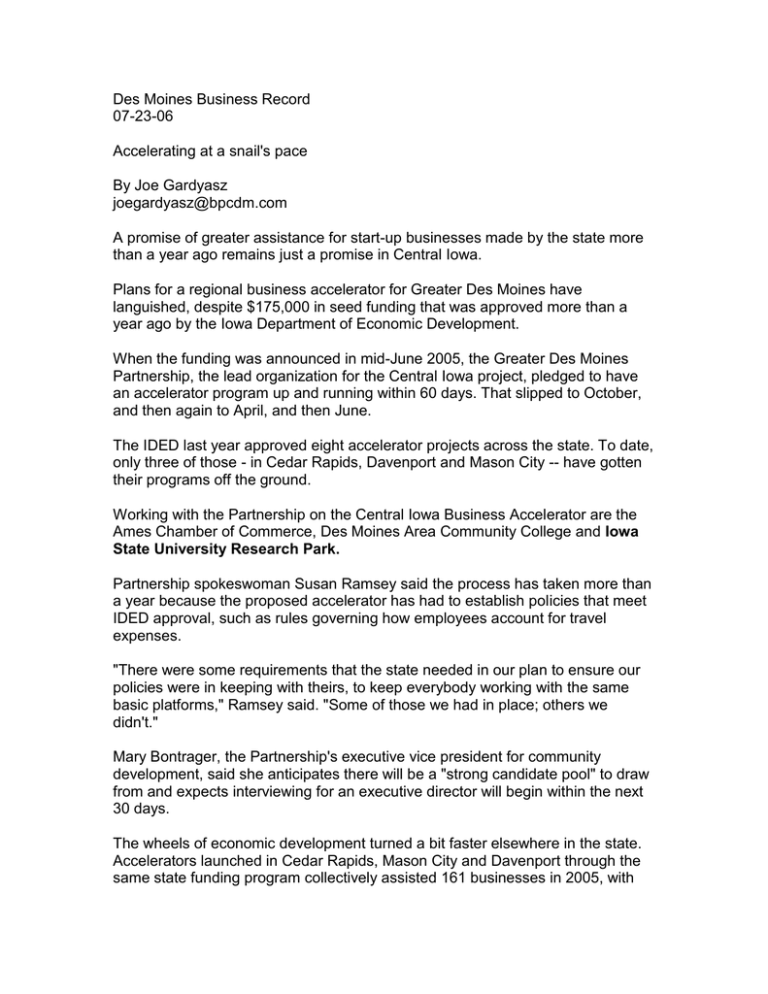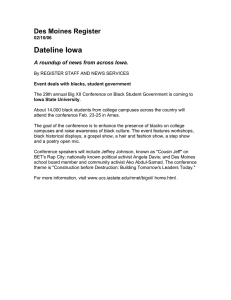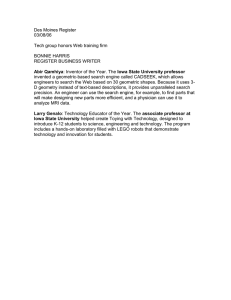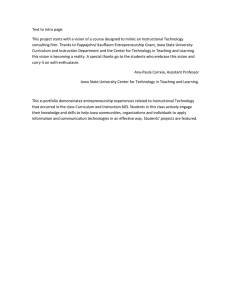Des Moines Business Record 07-23-06 Accelerating at a snail's pace By Joe Gardyasz
advertisement

Des Moines Business Record 07-23-06 Accelerating at a snail's pace By Joe Gardyasz joegardyasz@bpcdm.com A promise of greater assistance for start-up businesses made by the state more than a year ago remains just a promise in Central Iowa. Plans for a regional business accelerator for Greater Des Moines have languished, despite $175,000 in seed funding that was approved more than a year ago by the Iowa Department of Economic Development. When the funding was announced in mid-June 2005, the Greater Des Moines Partnership, the lead organization for the Central Iowa project, pledged to have an accelerator program up and running within 60 days. That slipped to October, and then again to April, and then June. The IDED last year approved eight accelerator projects across the state. To date, only three of those - in Cedar Rapids, Davenport and Mason City -- have gotten their programs off the ground. Working with the Partnership on the Central Iowa Business Accelerator are the Ames Chamber of Commerce, Des Moines Area Community College and Iowa State University Research Park. Partnership spokeswoman Susan Ramsey said the process has taken more than a year because the proposed accelerator has had to establish policies that meet IDED approval, such as rules governing how employees account for travel expenses. "There were some requirements that the state needed in our plan to ensure our policies were in keeping with theirs, to keep everybody working with the same basic platforms," Ramsey said. "Some of those we had in place; others we didn't." Mary Bontrager, the Partnership's executive vice president for community development, said she anticipates there will be a "strong candidate pool" to draw from and expects interviewing for an executive director will begin within the next 30 days. The wheels of economic development turned a bit faster elsewhere in the state. Accelerators launched in Cedar Rapids, Mason City and Davenport through the same state funding program collectively assisted 161 businesses in 2005, with services ranging from business plan reviews and management team recruitment to enture capital sourcing and market research. Half of those businesses, 79, were directly involved in life sciences, advanced manufacturing or information technology, the three industries targeted as key to building the state's economy, according to a year-end report issued by the IDED. The NIACC North Iowa Accelerator "virtually opened the doors immediately," said Jamie Zanios, director of the John Pappajohn Entrepreneurial Center at North Iowa Area Community College in Mason City. The accelerator was established as a department of the Pappajohn center shortly after the state funding was approved in late 2004, he said. Working within an existing organization that already had an office, conference room, computers and other infrastructure in place was a key advantage, Zanios said. "When we put together the application, we demonstrated what (business assistance services) we had available on campus already," he said. "We took a proactive approach in our proposal. Instead of waiting for people to come to us, we made a list of 200 businesses and canvassed those before we even had a director come on board." Because the Central Iowa accelerator project is a consortium of several economic development organizations that originally competed to solely administer the program, it's possible there has been friction among the groups, though no one's admitting it. "There was a lot of pressure over who would get it," Zanios said. "My guess is that the IDED told them to go back and figure out how to collaborate, and that complicated it. It's well worth it to collaborate, but sooner or later, you want to see it launched." Tina Hoffman, the IDED's deputy director, said the Central Iowa accelerator is among a group of three projects, with projects based in Dubuque and Red Oak, that are nearly ready to launch. "The three that got going right away actually had efforts prior to receiving funding," Hoffman said. "They were ahead of the game certainly." "Generally speaking, this is a pretty tall order," she added. "We're requiring people to have staff that have done this before, to have run businesses before. That is a difficulty across the board. There is also match money that has to be raised. If you look at the ones already running, they each have different models. There are many ways a community can set this up - finding the best one can take some time."


